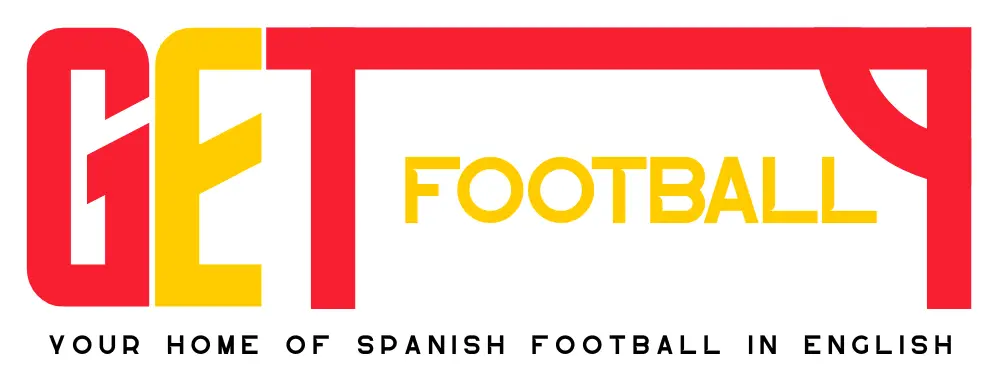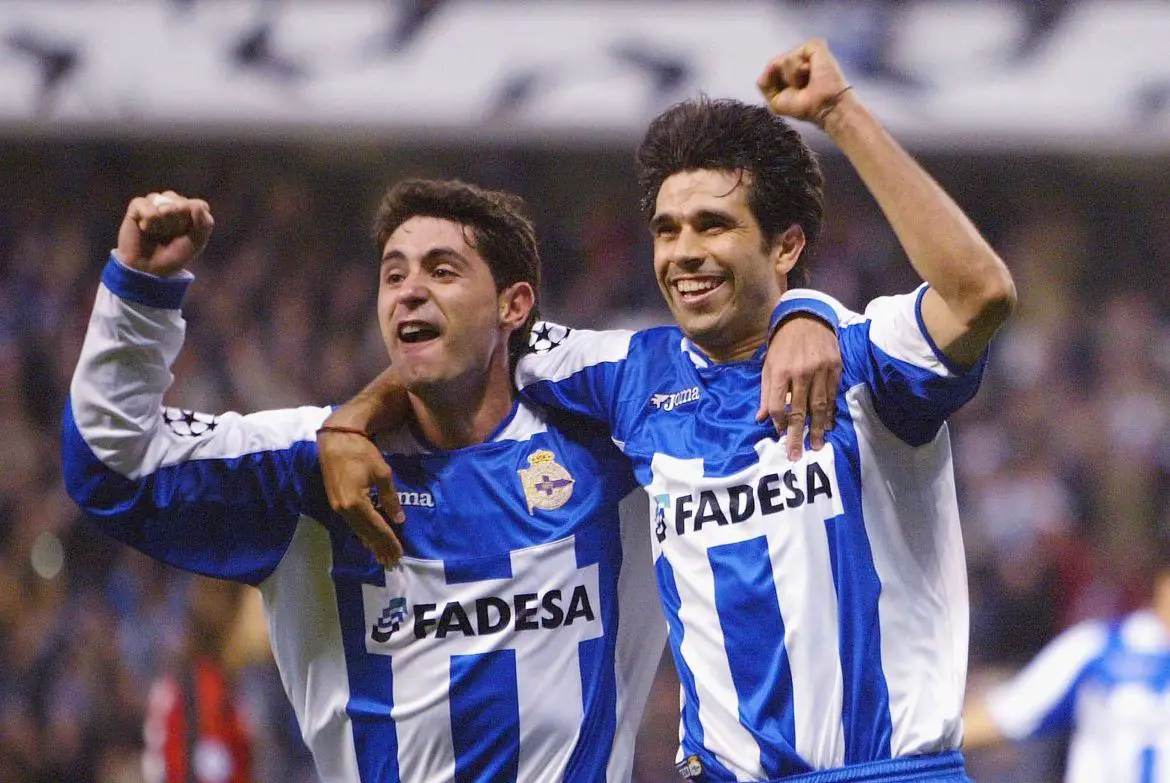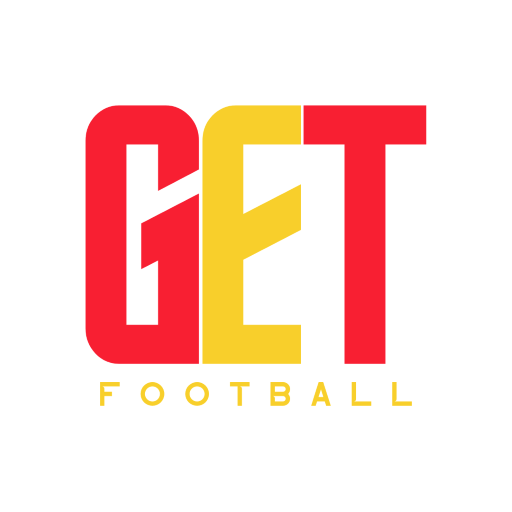For just over ten years at the end of the last century and beginning of the new one, the Galician seaside city of A Coruña was home to one of the best football teams in the world, one which broke up the traditional dominance of Real Madrid and Barcelona, one which brought exciting international talents to Spain’s rainy North West and took on the best that Europe had to offer. It was then that Real Club Deportivo de La Coruña earned the name SuperDepor.
The Wizard of Arteixo
Deportivo La Coruña had spent much of their history flitting between the Primera and Segunda, but the 1980s had been a dark time for the club, beginning with relegation to Segunda B and a number of years of mid-table mediocrity in the second tier.
This changed with the arrival of Augusto César Lendoiro as president in 1988. Under the stewardship of Arsenio Iglesias, a charismatic former player nicknamed O Bruxo de Arteixo (The Wizard of Arteixo) Deportivo gained promotion back to La Liga in 1991. Lendoiro sanctioned numerous big-money arrivals to make the side competitive, the most notable of these being Brazilians Mauro Silva and Bebeto. They helped Depor finish third behind Barcelona and Real Madrid, Bebeto winning the Pichichi award for the top goalscorer in La Liga, and qualify for Europe for the first time.
The 1993/94 season saw them lead the way in La Liga for much of the season, but ultimately coming up short in heartbreaking fashion.
Leading Barcelona by a point going into the final day, they needed to at least match the Catalans’ result to win the title. Barca beat Sevilla 5-2 at the Camp Nou but Depor’s game against Valencia at the Riazor was still tied 0-0 going into the final minutes, but then they were awarded a penalty. The destiny of La Liga would come down to just one kick of the ball. But who would take it? Donato was the designated penalty taker but had already been substituted, Bebeto, who had asked to be relieved of spot-kick duty after missing a couple earlier in the season didn’t want to take it. Miroslav Đukić, a defender who had only scored five goals for the club over four seasons, stepped up but hit it poorly and it was easily gathered by the Valencia goalkeeper, who celebrated wildly, kicking off an enmity between the two clubs fans which exists to this day.
The following season Depor again finished second, although this time some distance behind champions Real Madrid, but made history by winning the first trophy in the club’s history, the Copa del Rey against, of all teams, Valencia.
The final itself was remarkable, taking place over two days as extremely unseasonal rain and hail turned the Santiago Bernabéu pitch into one massive puddle forced the original game to be abandoned after 79 minutes with the score 1-1. Three days later the teams resumed and two minutes later, striker Alfredo Santaelena wrote his name into club history with the winning goal.
Irureta lands the La Liga title
Iglesias retired after winning the Copa del Rey and without his steady influence at the helm, Depor endured a few tumultuous seasons, finishing ninth, third and then twelfth in the league.
This instability was brought to an end in the summer of 1998 when Lendoiro appointed Basque coach Javier Irureta, fresh from leading their Galician rivals Celta Vigo to European qualification. He got Depor back on track in his first season, finishing sixth to qualify for the UEFA Cup but the following season was to be one which no one associated with the club would ever forget.
In one of the most unpredictable seasons in the history of Spanish football, Atlético Madrid, Sevilla and Betis were relegated, tiny Alavés and Rayo Vallecano qualified for Europe, Real Madrid finished fifth and only got back into the Champions League by winning it. But the biggest story of all was that Depor won the title.
Inspired by the goals of summer signing Roy Makaay, Irureta’s men hit the front early in the season and by the turn of the year were six points clear at the top. But this being Deportivo, they weren’t going to make it easy for themselves. January saw them only pick up one win in five games, before they returned to form with a 5-2 home win over Real Madrid. Their form became somewhat inconsistent, balancing home victories over Athletic, Mallorca and Valencia, with away defeats at the hands of Numancia, Málaga and Barcelona, who just like in 1994 seemed like their most realistic rivals.
And for a while history seemed to be repeating itself, a defeat in the Galician derby at Balaidos at the end of April helped cut Depor’s advantage over Barça to two points with three games left. But unlike 1994, the Catalans were unable to take advantage of Depor’s dropped points. In matchday 36, they lost 2-0 at home to Rayo while Depor drew with Zaragoza, who themselves were in with an outside chance of the title, then the next week while Depor drew with Racing, Barça were held by Real Sociedad.
It all came down to the final day once again, with the quirk of the fixture list meaning that both contenders had home games against the other side’s local rivals. At the Riazor, there was to be no repeat of the nervy encounter of six years previous as Donato headed Depor in front early on and a second goal from Makaay before half time essentially wrapped up the title and as the final whistle was blown fans flooded onto the pitch in celebration. It was particularly sweet for Donata, Mauro Silva and Fran, the only survivors of the Valencia game.
2002 – El Centenariazo
After winning La Liga for the first time, Irureta had already achieved legendary status in A Coruña but arguably the best years of his side were yet to come. Depor invested heavily in the transfer market in the summer of 2000, bringing in a new goalkeeper in José Molina, further striking options in Diego Tristan and Walter Pandiani and the languid midfield guile of Juan Carlos Valeron.
In the league, Depor actually picked up more points than they had in winning the title the season before, but could only finish second, seven points off the pace set by Real Madrid. But the real thrill came from their first experience of the Champions’ League where they topped their first and second round groups, eliminating Hamburg, Juventus, PSG and AC Milan along the way before they were surprisingly dumped out at the quarter-final stage by Leeds United, a 3-0 first-leg defeat at Elland Road proving too much of a hurdle to overcome despite goals from Djalminha and Tristan in A Coruña.
Deportivo continued to challenge at the top of La Liga in the 2001/02 season, leading the way for much of the early part of the season, but eventually having to settle for second behind Rafa Benitez’s Valencia after a mid-season loss of form which saw them drop as low as eighth at one stage. It was also a historic year in Europe as they did the double against Manchester United in the Champions’ League group stage on their way to the quarter-finals for the second successive year, where the Old Trafford club would ultimately exact revenge.
But one thing above all others dominated that season – the Copa del Rey Final of March 6 2002.
The significance of that date was that it was the 100th anniversary of Real Madrid’s foundation and to commemorate this, Madrid president Florentino Perez had requested that the Copa del Rey Final be held at the Bernabéu on that day.
Many people in Spain felt the whole thing was being set up for Madrid to win, so that day, excepting those who supported Madrid (or indeed Celta Vigo) the entire Spanish football community was pulling for Depor to spoil the party.
Taking advantage of the tenseness of their hosts, Depor flew out of the traps and battered them for the first 45 minutes. The opening goal came at the end of a great move as Depor pulled Madrid’s defence out of shape and left a huge gap for Sergio to run through and slot home. Then they doubled their advantage before half time as Diego Tristan converted Juan Carlos Valeron’s cross and pulled up his shirt to reveal a t-shirt emblazoned with the slogan “Riazor Blues on Tour” referencing the most prominent of the club’s ultra groups.
Raul pulled a goal back for Madrid after the break but it was to no avail as the Galicians held on to claim their second Copa triumph and to rub further salt into Madridista wounds, the travelling support serenaded the rapidly emptying Bernabéu with a chorus of “¡Cumpleaños feliz!” as the game slipped away from them. The centenariazo, as it was dubbed, would become an iconic moment in Spanish football history.
Tristan would finish that season as La Liga’s Pichichi, a feat repeated by his strike partner Roy Makaay (who also won the European Golden Boot) the following season, which saw Depor win the season-opening SuperCopa, but fail to pick up any further silverware, finishing third in the league and being eliminated at the second stage of the Champions’ League. However, football paled into insignificance compared to the news that goalkeeper José Molina was suffering from testicular cancer. Thankfully he would make a full recovery and return to play a major part in events to come.
EuroDepor – The Run to the Champions League semi-finals
The 2003/04 season saw Depor competing in the Champions’ League for the fifth successive season, but the early stages of the campaign gave little indication of what was to come. The group stage saw them lose 8-3 away to AS Monaco and only edge out PSV Eindhoven for second place on their head-to-head record.
But the second round in the spring saw Depor in much better form, winning 1-0 home and away against the previous season’s beaten finalists Juventus to set up a quarter-final with the holders AC Milan.
Milan were on their way to winning the Serie A title and with the addition of Brazilian playmaker Kaka, were arguably a much stronger side than the one which had lifted the trophy in Manchester the year before and in the first leg at the San Siro they lived up to their billing as tournament favourites, blowing Depor away with a 4-1 victory. The only crumb of comfort came from Pandiani’s away goal, which had ironically enough given Depor the lead, but few gave them any chance of turning it around at the Riazor. After all, in the history of the Champions League, no team had ever turned around a three goal deficit after the first leg…
But the Riazor started to believe in miracles when Pandiani turned Maldini and rolled the ball past Dida to open the scoring after five minutes. Molina made a vital stop to deny Kaka before Valeron rose above everybody to head in the second goal and then just before the break, Luque burst through the rossoneri defence and slammed the ball into the top corner. Now Depor were ahead in the tie courtesy of the away goals rule.
The clinching goal came in the 76th minute as Fran’s powerful shot clipped off Cafu and looped past the stranded Dida. Milan desperately pushed for an equaliser but the brilliant Molina was equal to everything the Italian club’s star-studded attack could throw at him.
After that it was almost inevitable that the semi-final would prove a letdown. In a semi-final line-up full of outsiders, Depor avoided nouveau-riche Chelsea and their group stage conquerors Monaco and were paired with UEFA Cup holders Porto, then managed by Jose Mourinho. The first leg of the tie at the Estadio do Dragão was an attritional 0-0 with the most notable incident being a controversial red card for Depor’s Jorge Andrade. It was something Depor would come to regret as in the 60th minute of the return leg, Andrade’s replacement, César Martín, gave away a penalty with a clumsy foul. Derlei made no mistake from the spot and Porto successfully parked the bus, making sure there was no repeat of Depor’s quarter-final heroics.
Although the European campaign ended in disappointment, Depor still finished the domestic season strongly to ensure they finished in the top three for the fifth successive season.
End of an Era
After so many consistent years as one of the major forces in Spanish football, the 2004/05 season came as a major shock to the system. It started badly, with a Champions’ League qualifying tie against Irish champions Shelbourne which saw Depor flirt with embarrassment, drawing the first leg 0-0 in Dublin and then being held goalless in A Coruña for an hour until Victor finally broke through and set them on their way to a 3-0 win.
With financial issues preventing any strengthening of the squad that summer, the players who had won so much glory for the club were struggling to maintain those high standards. In hindsight it is pretty obvious that the defeat by Porto had a long-lasting effect, robbing these players of what would be their only chance to achieve something historic.
It was to prove a miserable season on all fronts as Deportivo crashed out of the Champions’ League group stages and ended up finishing eighth in La Liga, only enough to earn a spot in the much-derided Inter-Toto Cup for the following season. Irureta left the club at the end of the campaign, to be replaced by Joaquin Caparrós, while it also marked the end of the Deportivo careers of stalwarts Fran and Mauro Silva, the two remaining heroes of the original SuperDepor.
Decline
After that season, Depor would no longer dine at the top table of Spanish football, beginning a slide into mediocrity, which would culminate in relegation in 2011 after twenty years in the top flight. The free-spending which had propelled their rise came to a halt and instead they became a selling club as Lendoiro tried to balance the books without regular European revenue.
The 2010s saw them become an elevator team, relegated three times, and promoted twice and were also blighted by financial issues after the club filed for bankruptcy in 2013 and President Lendoiro stood down later that year.
The glory days seem a long way off now as they battle relegation from the Segunda and the latest financial crisis which has put their existence at risk.











